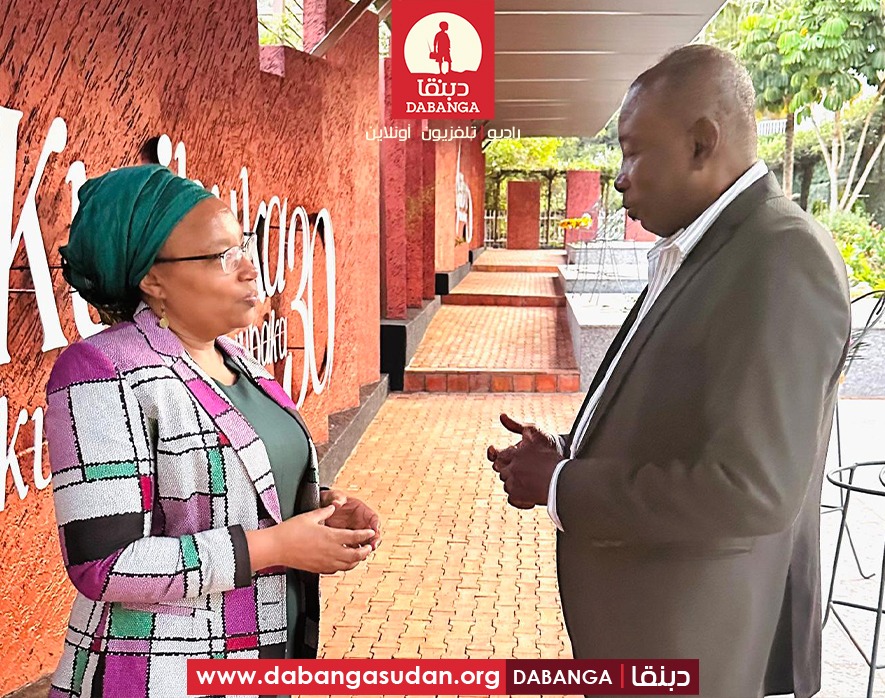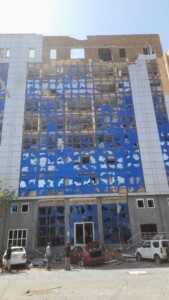UN genocide prevention adviser: ‘Sudan is so much more than Burhan and Hemedti’

Kamal Elsadig, Radio Dabanga editor-in-chief, interviewing Alice Nderitu, the UN USG and Special Adviser on the Prevention of Genocide at the workshop organised by the United Nations Office of the Special Adviser on the Prevention of Genocide and the Aegis Trust in Kigali, the capital of Rwanda (Photo: RD)
Alice Wairimu Nderitu, the United Nations Under Secretary-General and Special Adviser of the Secretary-General on the Prevention of Genocide, was interviewed yesterday by Radio Dabanga at a workshop organised by the United Nations Office of the Special Adviser on the Prevention of Genocide and the Aegis Trust in Kigali, the capital of Rwanda.
In an interview with Kamal Elsadig, editor-in-chief of Radio Dabanga, the UN special adviser for genocide prevention, Alice Nderitu, emphasised the crucial role of media in countering hate speech: “No genocide in the world has happened without being preceded, accompanied, or followed by hate speech. Journalists from all over the world are now here to create a plan of action to counter this.”
The three-day conference, organised by the Aegis Trust, the United Nations, and other partners, took place at the Kigali Genocide Memorial, which documents the 1994 Rwandan Genocide against the Tutsi. It focused on the role of journalists and the media in preventing incitement to violence that could lead to genocide.
Nderitu highlighted the importance of documenting hate speech, “which is prevalent on social media in Sudan”, to hold perpetrators accountable: “Document, document, document all hate speech. This is essential for accountability when the time comes.”
Concerned over the rising levels of hate speech and incitement in Sudan, Nderitu told Radio Dabanga: “We have seen videos inciting Sudanese to fight each other, including videos from foreign countries. This information is crucial for accountability purposes”.
She also emphasised the importance of preserving evidence for future legal actions, even in difficult circumstances where access to technology is limited. “If you take photos on your phone, please send them to somebody else. So that if you lose your phone, there is a record somewhere.
“People must keep memory alive and continue speaking about this. The time will come when they will be required as witnesses to what has happened in Sudan.”
Risk of genocide
“If the security situation you have created is so bad that food cannot reach people, you need to understand that you are participating in their deaths and can be held accountable for genocide.”
Alice Wairimu Nderitu, UN USG and Special Adviser of the Secretary-General on the Prevention of Genocide
The UN special adviser on genocide prevention expressed her belief all the risk factors for genocide exist in Sudan, “especially in Darfur, where there has been specific incitement to violence and intent to destroy certain ethnic communities”.
She however noted that “only a court of law” can determine whether genocide has occurred in Sudan. “The International Criminal Court (ICC) prosecutor now has jurisdiction over the whole of Sudan, and some people have already been indicted, but more needs to be done by the ICC.”
When discussing the ongoing humanitarian crisis in Sudan, Nderitu condemned the warring factions in Sudan for obstructing humanitarian aid.
“If the security situation you have created is so bad that food cannot reach people, you need to understand that you are participating in their deaths and can be held accountable for genocide. Those carrying guns in Sudan must know they can be held accountable for creating a situation where food cannot reach people”, she warned.
She called for concerted efforts from governments and the private sector to provide food aid, and applauded the UN and other humanitarian organisations that are “on the ground providing food” despite security challenges.
“I do not understand why the world and the media have prioritised Ukraine and Gaza over Sudan. We should wake up every day and see the faces of Sudanese children dying, the women subjected to sexual violence, and the perpetrators brandishing their guns.”
Nderitu has released 10 statements on Sudan in her capacity as USG, “more than any other situation I have addressed”, to raise awareness and urge preventive measures. “I have issued quite a number of statements on Sudan in the past about the Blue Nile, about Kordofan. And now I have also issued statements about Khartoum”.
Frustrated at the international community for not prioritising Sudan compared to other conflicts, Nderitu told Elsadig: “I do not understand why the world and the media have prioritised Ukraine and Gaza over Sudan. We should wake up every day and see the faces of Sudanese children dying, the women subjected to sexual violence, and the perpetrators brandishing their guns”.
A way forward
While Nderitu noted to Dabanga that the UNSG appointed a special envoy, Ramtane Lamamra, to mediate between the conflicting parties, she nonetheless emphasised the need for a comprehensive approach to resolving the conflict, involving not just the two generals but the broader Sudanese society. “Sudan is more than General Burhan and General Hemedti. We need to start talking to those other people to see in what direction Sudan can go”.
She concluded with a plea for resilience, expressing her hope for a better future for Sudan. “I speak to you as a sister; my heart is completely broken. Please, do not give up. One day, you will go back to Sudan, and it will be the country it was before, or even better. Under our watch, we will not allow Sudan to become lawless.”











 and then
and then